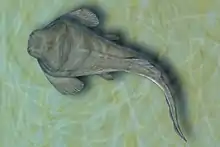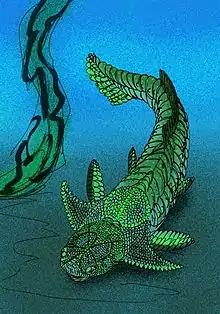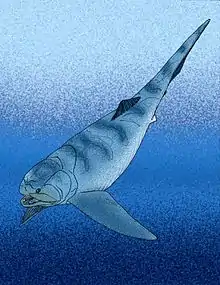Heterosteus
Heterosteus is an extinct genus of heterosteid placoderm known from remains discovered in Europe and Greenland.
| Heterosteus | |
|---|---|
 | |
| Life reconstruction of Heterosteus ingens | |
| Scientific classification | |
| Kingdom: | |
| Phylum: | |
| Class: | |
| Order: | |
| Suborder: | not Gross, 1932 |
| Family: | |
| Genus: | Heterosteus Asmuss, 1856 |
| Species | |
| Synonyms | |
| |
Description
This genus includes the largest species in the family, and are among the largest arthrodires, as well, with the type species, H. asmussi, having an estimated body length of up to 6 metres (19 ft 8 in).[1] The genus differs from Herasmius by having the orbits on slightly longer eyestalk-like projections. The various species are found in Givetian-aged deposits in Europe and Greenland. With the except of the German H. rhenanus, all species are known from freshwater deposits: H. rhenanus is based on fragments found in a marine deposit.
References
- Denison, Robert (1978). Placodermi Volume 2 of Handbook of Paleoichthyology. Stuttgart New York: Gustav Fischer Verlag. p. 66. ISBN 978-0-89574-027-4.
This article is issued from Wikipedia. The text is licensed under Creative Commons - Attribution - Sharealike. Additional terms may apply for the media files.


